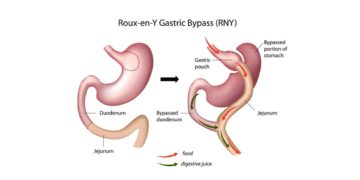Severe obesity is a chronic condition that is hard to treat with diet and exercise alone. Bariatric surgery is an operation on the stomach and/or intestines that helps patients with extreme obesity to lose weight. This surgery is an option for people who cannot lose weight by other means or who suffer from serious health problems related to obesity. The surgery restricts food intake, which promotes weight loss and reduces the risk of type 2 diabetes. Some surgeries also interrupt how food is digested, preventing some calories and nutrients, such as vitamins, from being absorbed. Recent studies suggest that bariatric surgery may even lower death rates for patients with severe obesity. The best results occur when patients follow surgery with healthy eating patterns and regular exercise.
Bariatric Surgery for Adults
Currently, bariatric surgery may be an option for adults with severe obesity. Body mass index (BMI), a measure of height in relation to weight, is used to define levels of obesity. Clinically severe obesity is a BMI > 40 or a BMI > 35 with a serious health problem linked to obesity. Such health problems could be type 2 diabetes, heart disease, or severe sleep apnea (when breathing stops for short periods during sleep).
Who is a good adult candidate for surgery?
Having surgery to produce weight loss is a serious decision. Anyone thinking about having this surgery should know what it involves. Answers to the following questions may help patients decide whether weight-loss surgery is right for them.
Is the patient:
- Unlikely to lose weight or keep it off over the long term using other methods?
- Well informed about the surgery and treatment effects?
- Aware of the risks and benefits of surgery?
- Ready to lose weight and improve his or her health?
- Aware of how life may change after the surgery? (For example, patients need to adjust to side effects, such as the need to chew food well and the loss of ability to eat large meals.)
- Aware of the limits on food choices, and occasional failures?
- Committed to lifelong healthy eating and physical activity, medical follow-up, and the need to take extra vitamins and minerals?
There is no sure method, including surgery, to produce and maintain weight loss. Some patients who have bariatric surgery may have weight loss that does not meet their goals. Research also suggests that many patients regain some of the lost weight over time. The amount of weight regain may vary by extent of obesity and type of surgery. Habits such as snacking often on foods high in calories or not exercising can affect the amount of weight loss and weight regain. Problems that may occur with the surgery, like a stretched pouch or separated stitches, may also affect the amount of weight loss.
Success is possible. Patients must commit to changing habits and having medical follow-up for the rest of their lives.
























 Your Information will never be shared with any third party.
Your Information will never be shared with any third party.